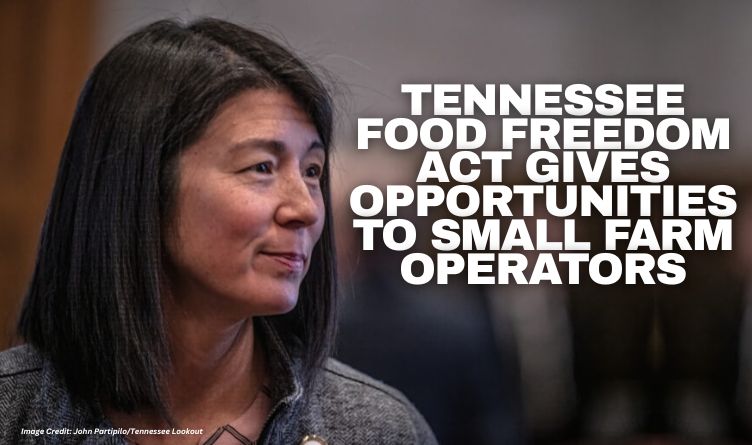State law allows sales of shelf-stable items including eggs, butter, some cheeses directly from farmers to consumers.
Image: Rep. Michele Reneau Image Credit: John Partipilo/Tennessee Lookout
By Anne Braly [Tennessee Lookout -CC BY-NC-ND 4.0] –
No one understands the partnership between the earth and its people better than those who steward the land. But for generations, farmers in the Volunteer State could not make direct sales to the public of temperature-controlled foods or canned goods.
That changed in 2022 when state lawmakers passed the Tennessee Food Freedom Act. The bill allowed farmers and other cottage-food producers to sell certain homemade, nonperishable foods, including baked goods and jams, with no need for inspection or licensing.
Recently, the Tennessee House of Representatives expanded Tennessee’s cottage-food laws with the passage of HB130, enabling Tennessee farmers and food entrepreneurs to legally sell homemade foods that include perishable foods such as dairy, eggs and poultry.
“This gives small producers more flexibility to meet the growing demand for local, fresh and prepared foods,” said bill sponsor Rep. Michele Reneau, a Signal Mountain Republican.
The bill does not allow the sale of unpasteurized milk and other unpasteurized dairy products.
Within the past year, lawsuits have been filed against a Florida dairy farm found by the Florida State Health Department to have sold unpasteurized dairy products linked to at least 21 cases of campylobacter and shiga toxin-producing E. coli. The cases include a pregnant mother who consumed raw milk, became sick and lost her unborn baby.
Elizabeth Stuart has farmed her Crossing Creeks Farm in Shelbyville for the past 12 years, practicing regenerative farming to raise beef cattle, pigs, turkeys and chickens for meat and eggs.
Though the farm has a commercial kitchen, Stuart realizes the importance of the Food Freedom Act for those farms that do not.
“We believe that the Food Freedom Act is an important asset to Tennessee farmers and artisans,” she said. “For example, farmers who have a bumper crop of vegetables, or chicken, meat or eggs, now have the ability to turn that into a value-added product instead of it becoming waste. This increases the amount of local food sources within the state.”

The welfare of local farmers and food entrepreneurs is at the heart of the bill, said Reneau.
“This bill is about freedom and opportunity,” Reneau said, adding that the new legislation negates the need for inspections and commercial licensing that costs food producers nearly $500.
“Tennessee families love buying directly from people they know and trust, and small farms and home kitchens want the ability to serve their communities without unnecessary red tape,” she said.
Reneau compares the Food Freedom Act to shared community meals, such as pot-luck dinners with friends and neighbors.
“We already trust each other with food in our communities,” she said. “This simply extends that same trust to local farmers and food entrepreneurs so more of them can start businesses or expand what they offer.”
The Food Freedom Act enables farmers and small-food producers to diversify their offerings, from soups and stews to casseroles with perishable ingredients, such as poultry and dairy, giving the “little guy” a fairer chance to compete or get started in the food business.
The idea is to create an incubator of sorts, a stepping stone that may lead to commercial operations in larger cities, while giving those in rural areas with no access to commercial kitchens a viable option to sell locally.
The 2022 Food Freedom Act enabled farmers to sell shelf-stable items requiring no refrigeration or special handling. Now, prepared chicken, such as rotisserie chicken, soups and pot pie, plus butter, eggs, yogurts, hard cheeses and kefir can be sold directly to consumers.
Bird Fork Farm is a Certified Naturally Grown small seed-to-bottle apothecary farm in Dunlap. The farm produces organically grown vegetables, fruits and herbs in addition to locally grown or foraged teas, spices, extracts, syrups, body care products, ferments and vinegars.
Alysia Leon of Bird Fork says the Food Freedom Act has allowed her farm to cut down on food waste and offer farm-fresh products year-round. While the farm does not produce meat and dairy products, updates allowing the sale of temperature-controlled foods opens revenue resources once denied Tennessee farmers.
“We know this update has allowed other farmer friends the ability to expand their operations,” Leon says. “It cuts down on food waste to create value-added products, and it gives farmers the benefit of the doubt that they are doing things the right way.”
The bill has received overwhelming approval from cottage-food producers, Reneau said.
“Many have told me they’ve been waiting years to sell more of the foods they already make at home, but costs and regulations have prevented that. Customers are just as excited,” she said. “They want more local choices and more ways to support their neighbors.
“It’s truly a win-win for producers and consumers, and I hope Tennessee’s Food Freedom Act becomes a model for other states.”




3 Responses
We need to make sure that any land purchased by the Chinese Government is returned to the people of Tennessee. They are buying up farms and acreage to continue their goal of seizing our country. Buyers of property must be more stringently screened and weeded.
You are 100% correct. A bill needs to be introduced this coming session. They DID pass a bill that land sales to foreign nationalists must be reported, but no sanctions have been mandated yet. Talk to your legislator.
GOOD!!